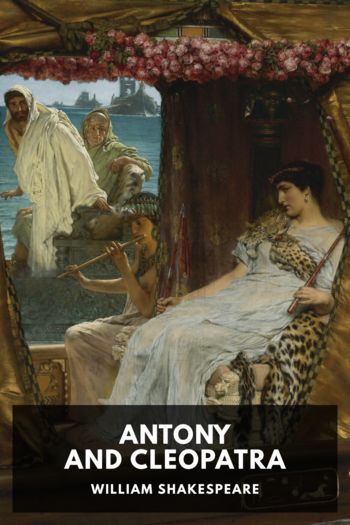Julius Caesar, William Shakespeare [top ten books of all time txt] 📗

- Author: William Shakespeare
Book online «Julius Caesar, William Shakespeare [top ten books of all time txt] 📗». Author William Shakespeare
Have not you love enough to bear with me,
When that rash humour which my mother gave me
Makes me forgetful?
Yes, Cassius; and, from henceforth,
When you are over-earnest with your Brutus,
He’ll think your mother chides, and leave you so.
Within. Let me go in to see the generals;
There is some grudge between ’em, ’tis not meet
They be alone.
For shame, you generals! what do you mean?
Love, and be friends, as two such men should be;
For I have seen more years, I’m sure, than ye.
I’ll know his humour, when he knows his time:
What should the wars do with these jigging fools?
Companion, hence!
Lucilius and Titinius, bid the commanders
Prepare to lodge their companies to-night.
And come yourselves, and bring Messala with you
Immediately to us. Exeunt Lucilius and Titinius.
Of your philosophy you make no use,
If you give place to accidental evils.
How ’scaped I killing when I cross’d you so?
O insupportable and touching loss!
Upon what sickness?
Impatient of my absence,
And grief that young Octavius with Mark Antony
Have made themselves so strong:—for with her death
That tidings came;—with this she fell distract,
And, her attendants absent, swallow’d fire.
Speak no more of her. Give me a bowl of wine.
In this I bury all unkindness, Cassius.
My heart is thirsty for that noble pledge.
Fill, Lucius, till the wine o’erswell the cup;
I cannot drink too much of Brutus’ love.
Welcome, good Messala.
Now sit we close about this taper here,
And call in question our necessities.
No more, I pray you.
Messala, I have here received letters,
That young Octavius and Mark Antony
Come down upon us with a mighty power,
Bending their expedition toward Philippi.
That by proscription and bills of outlawry,
Octavius, Antony, and Lepidus,
Have put to death an hundred senators.
Therein our letters do not well agree;
Mine speak of seventy senators that died
By their proscriptions, Cicero being one.
Cicero is dead,
And by that order of proscription.
Had you your letters from your wife, my lord?
Then like a Roman bear the truth I tell:
For certain she is dead, and by strange manner.
Why, farewell, Portia. We must die, Messala:
With meditating that she must die once,
I have the patience to endure it now.
I have as much of this in art as you,
But yet my nature could not bear it so.
Well, to our work alive. What do you think
Of marching to Philippi presently?
This it is:
’Tis better that the enemy seek us:
So shall he waste his means, weary his soldiers,
Doing himself offence; whilst we, lying still,
Are full of rest, defense, and nimbleness.
Good reasons must, of force, give place to better.
The people ’twixt Philippi and this ground
Do stand but in a forced affection;
For they have grudged us contribution:
The enemy, marching along by them,
By them shall make a fuller number up,
Come on refresh’d, new-added, and encouraged;
From which advantage shall we cut him off,
If at Philippi we do face him there,
These people at our back.
Under your pardon. You must note beside,
That we have tried the utmost of our friends,
Our legions are brim-full, our cause is ripe:
The enemy increaseth every day;
We, at the height, are ready to decline.
There is a tide in the affairs of men,
Which, taken at the flood, leads on to fortune;
Omitted, all the voyage of their life
Is bound in shallows and in miseries.
On such a full sea are we now afloat;
And we must take the current when it serves,
Or lose our ventures.
Then, with your will, go on;
We’ll along ourselves, and meet them at Philippi.
The deep of night is crept upon our talk,
And nature must obey necessity;
Which we will niggard with a little rest.
There is no more to say?
No more. Good night:
Early to-morrow will we rise, and hence.
Lucius! Enter Lucius. My gown. Exit Lucius. Farewell, good Messala:
Good night, Titinius. Noble, noble Cassius,
Good night, and good repose.
O my dear brother!
This was an ill beginning of the night:
Never come such division ’tween our souls!
Let it not, Brutus.
What, thou speak’st drowsily?
Poor knave, I blame thee not; thou art o’erwatch’d.
Call Claudius and some other of my men;
I’ll have them sleep on cushions in my tent.
I pray you, sirs, lie in my tent and sleep;
It may be I shall raise you by and by
On business to





Comments (0)